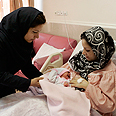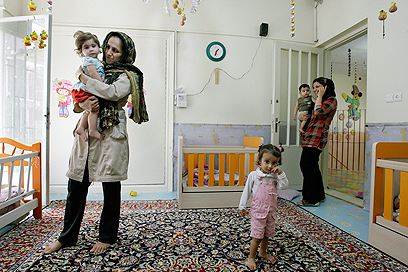
Iran's new message to parents: Get busy and have babies.
In a major reversal of once far-reaching family planning policies, authorities are now slashing its birth-control programs in an attempt to avoid an aging demographic similar to many Western countries that are struggling to keep up with state medical and social security costs.
The changes - announced in Iranian media last week - came after Supreme Leader Ayatollah Ali Khamenei described the country's wide-ranging contraceptive services as "wrong." The independent Shargh newspaper quoted Mohammad Esmail Motlaq, a Health Ministry official, as saying family planning programs have been cut from the budget for the current Iranian year, which began in March.
Related articles:
- Iran accuses Israel of plotting Bulgaria bus attack
- Op-ed: The truth about Iran
- Barak: Nuclear Iran more dangerous than strike
It's still unclear, however, whether the high-level appeals for bigger families will translate into a new population spike. Iran's economy is stumbling under a combination of international sanctions, inflation and double-digit unemployment. Many young people, particularly in Tehran and other large cities, are postponing marriage or keeping their families small because of the uncertainties.

Kindergarten in Iran (Photo: AP)
Ali Reza Khamesian, a columnist whose work appears in several pro-reform newspapers, said the change in policy also may be an attempt to send a message to the world that Iran is not suffering from sanctions imposed over the nuclear program that the West suspects is aimed at producing weapons - something Tehran denies.
Abbas Kazemi, a doorman in a private office building, said he cannot afford to have more than two children with his salary of about $220 (4.2 million rials) a month.
"I cannot afford daily life," he said. "I have to support my wife and two children as well my elderly parents."
'The culture still exists in the rural areas'
More than half of Iran's population is under 35 years old. Those youth form the base of opposition groups, including the so-called Green Movement that led unprecedented street protests after President Mahmoud Ahmadinejad's disputed re-election in 2009. Some experts have said that trying to boost the numbers for upcoming generations also could feed future political dissent.
"Young people are the heart of the Arab Spring, or the Islamic Awakening as Iran calls it," said Mustafa Alani, an analyst at the Gulf Research Center based in Geneva. "Countries that haven't faced major protests during the Arab Spring still have to be mindful that the demands of the youth are still there."
The policy shift brings the country full circle.
After the 1979 Islamic Revolution, families were strongly encouraged to contribute to a baby boom demanded by leader Ayatollah Ruhollah Khomeini, who wanted fast population growth to contribute to a "20 million member army" in support of the ruling theocracy. In 1986, toward the end of the eight-year war with Iraq, census figures show the population's growth rate reached 3.9% - among the highest in the world at the time and in line with Persian traditions that favor big families.
But the leadership just as quickly hit the brakes in the 1990s, fearing a galloping population could overwhelm the economy. Iran became a regional leader in family-planning options, including offering free or subsidized condoms and other contraceptives, and issuing religious edicts in favor of vasectomies. One clinic in Tehran promoted its vasectomy services in huge letters atop a water tower.
Banners at public health care centers urged smaller families as a path to a better life. By 2011, the most recent period for which figures are available, Iran's population growth had fallen to one of the lowest in region - 1.3%.
The official policy changes began in 2005 after the election of President Ahmadinejad, who called the birth control measures ungodly and a Western import. In 2009, he unveiled proposals for each new baby to receive $950 in a government bank account and then get $95 every year until reaching 18.
On Wednesday, Khamenei said contraceptive policy made sense 20 years ago, "but its continuation in later years was wrong."
"Scientific and experts studies show that we will face population aging and reduction (in population) if the birth-control policy continues," said Khamenei a day after the Statistical Center of Iran said the country's population had reached more than 75.1 million - more than double its 33.7 million in 1976.
Ali Reza Mesdaghinia, the deputy health minister, told the semiofficial Fars news agency on Sunday that population control programs "belonged to the past."
"There is no plan to keep number of the children at one or two. Families should decide about it by themselves," said Mesdaghinia. "In our culture, having a large number of children has been a tradition. In the past families had five or six children. ... The culture still exists in the rural areas. We should go back to our genuine culture."
Lawmaker Moayed Hoseini said on the parliament's website that some 100 lawmakers have signed a bill aimed at canceling the pro-family planning laws from the early 1990s.
A midwife, Fatemeh Iranmanesh, said the number of pregnancies climbed in rural areas after Ahmadinejad's promise for greater aid to families. "Sometime a pregnant mother comes to me with her last infant still breast-feeding," she said.
- Follow Ynetnews on Facebook and Twitter
- Receive Ynetnews updates
directly to your desktop















